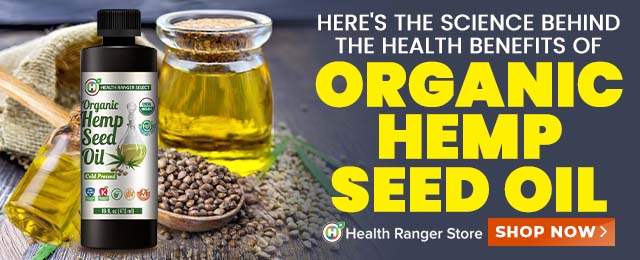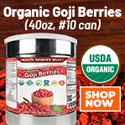
Isolated Soy Protein Shown To Benefit Patients With Type 2 Diabetes; Enhances HDL Cholesterol Levels
 Friday, August 06, 2004 Friday, August 06, 2004by Mike Adams, the Health Ranger Editor of NaturalNews.com (See all articles...) Tags: isolated soy protein, soy protein, soy protein powder |
- Chemtrails unveiled: How the CIA and Big Business are manipulating the weather for profit
- Israeli lobbyists boast of controlling US national security policy in leaked AIPAC audio
- Tulsi Gabbard leads charge against the Biden regime’s global censorship of the 'Disinformation Dozen'
- Mysterious underwater pyramid off Japan could rewrite ancient history
- Fauci is back in the limelight, and he’s busy promoting a future COVID or FLU pandemic
- Geoengineers forced into secrecy as public backlash grows: How climate elites are manipulating populations to accept geoengineering experiments
- Analysis: The coming economic collapse, a mass uprising and Trump's three secret weapons to halt the growing revolt
- Pfizer's RSV vaccine linked to preterm births as drug giant CONCEALED RISKS from pregnant women in unethical clinical trials
- Shedding light on the dark side of MMR vaccines: How vaccinated individuals SPREAD MEASLES & put the vulnerable at risk
- How to live without electricity: A practical guide for survival and preparedness
- Aerosolized bioweapons? Strange “diploid biomasses” falling out of the sky in Florida captured under the microscope
- Common household chemicals linked to America's depression epidemic
- The HEART-HEALING power of SEVEN Mediterranean plants
- Kiss Your Genetic Privacy Good-Bye! 23andMe Gets Green Light to Sell Your Intimate Genetic Details to Anyone They Want
- Widespread social and economic unrest: Steve Quayle issues urgent financial warning of imminent asset collapse in new interview with Mike Adams
- U.S. lawmakers investigate Meta over alleged China collaboration
- Tulsi Gabbard takes aim at censorship: Justice for the ‘Disinformation Dozen’
- Dane Wigington exposes climate engineering as ‘All-Out Weather and Biological Warfare’
- Aerosolized bioweapons? Strange “diploid biomasses” falling out of the sky in Florida captured under the microscope
- Widespread social and economic unrest: Steve Quayle issues urgent financial warning of imminent asset collapse in new interview with Mike Adams
- CLOT SHOT PLANDEMIC UNFOLDING: Fibrous, rubbery clots caused by covid injections have prion-like seeding activity
- Analysis: The coming economic collapse, a mass uprising and Trump's three secret weapons to halt the growing revolt
- Kiss Your Genetic Privacy Good-Bye! 23andMe Gets Green Light to Sell Your Intimate Genetic Details to Anyone They Want
- Tulsi Gabbard leads charge against the Biden regime’s global censorship of the 'Disinformation Dozen'
- Mike Adams releases country western hit single: Goin’ Back in Time is Comin’ Home
- DEATH by VACCINE or face PRISON time: Canadian Freedom Convoy leaders CONVICTED for protesting forced vaccination during the Covid Plandemic
- Fauci is back in the limelight, and he’s busy promoting a future COVID or FLU pandemic
- How Israeli military-connected corporations are secretly controlling your online privacy
- European Court of Justice: Healthcare professionals who promoted or administered COVID-19 vaccines are CRIMINALLY LIABLE for any harm caused
- Defunding DEADLY mRNA jabs: Government funding for mRNA technology being scrutinized and sidelined until proven "safe and effective" for real
- Tulsi Gabbard takes aim at censorship: Justice for the ‘Disinformation Dozen’
- Federal employees whine over DOGE's new directive requiring them to do a 5-point summary of weekly accomplishments
- U.S. approves new Russian ambassador as diplomatic thaw continues
- I Want My Bailout Money – new song and music video released by Mike Adams
- Trump administration poised to overhaul crypto regulations with new SEC leadership
- I Want My Bailout Money – new song released by Mike Adams
- Newly released JFK files reveal Pentagon's role in creating Lyme disease and covid in the same lab
- Mike Adams releases country western hit single: Goin’ Back in Time is Comin’ Home
- Analysis: The coming economic collapse, a mass uprising and Trump's three secret weapons to halt the growing revolt
- MEDICAL BOMBSHELL: FDA admits Covid mRNA 'Vaccines' CAUSE CANCER
- Dr. Mike Yeadon releases 15-minute testimony - WATCH - about genocidal intent of COVID “vaccines”
- Trump reverses course on Gaza plan, says “nobody is expelling Palestinians”
- 5 Simple steps to boost your brainpower: How to strengthen executive function in a distracted world
- The Health Ranger releases “Vaccine Zombie” song and music video, using AI-animated zombies for the music video
- California's social media censorship law struck down: A victory for free speech or a threat to online safety?
- Rep. Nancy Mace introduces bill to ban biological males from female facilities on federal property
- EPA advisor admits the agency is funneling billions to climate groups ahead of Trump’s return to White House
- Survival 101: Effective EMF blocking techniques
- Aerosolized bioweapons? Strange “diploid biomasses” falling out of the sky in Florida captured under the microscope
- OpenAI whistleblower who dissented against how the company trained ChatGPT found dead
- Trump Administration cuts 2,000 USAID jobs, places most employees on leave in sweeping reform effort
- A lack of integrity in Academia: Harvard professor found GUILTY of fraudulent research to promote CRT theory
- Sugarcane extract superior to cholesterol-lowering drugs?
- RFK Jr.'s SSRI antidepressant investigation sparks liberal meltdown, exposes Big Pharma's dangerous game
- Red Cross issues warning to stop blood plasma donations from vaccinated people
- Scientists confirm: GENIUS brain function can be spontaneously unleashed in humans without any apparent cause
- EPA advisor admits the agency is funneling billions to climate groups ahead of Trump’s return to White House
- HYSSOP: What research reveals about the health benefits of this ancient holy herb
- Two containers with completed ballots fall out of truck in Florida
- Fully vaccinated about to see “tsunami” of illness and death, warns virologist
- Global leaders unite to clamp down on “misinformation” with UN-backed Cascais Declaration
- Newly released JFK files reveal Pentagon's role in creating Lyme disease and covid in the same lab
- BREAKING: 2025 NDAA authorizes mandatory military draft of WOMEN across America… as Pentagon pursues global NUCLEAR war with both Russia and China at the same time
- Michael Yon warns of a ZIONIST TAKEOVER in Trump’s second administration
- Ozempic and Wegovy weight loss drugs are injectable LIZARD VENOM PEPTIDES that may unleash a devastating wave of organ failure… side effects align with symptoms of SNAKE BITES
- The Health Ranger releases “Vaccine Zombie” song and music video, using AI-animated zombies for the music video
- BOMBSHELL: DNA testing kits are a SCAM to develop ethnic-specific bioweapons
- Israeli soldiers accused of even more torture and abuse in the West Bank
- These 13 countries just signed an agreement to engineer a global FAMINE by destroying food supply
- Mike Adams releases country western hit single: Goin’ Back in Time is Comin’ Home
- NASA admits that climate change occurs because of changes in Earth’s solar orbit, and NOT because of SUVs and fossil fuels
- RFK Jr. clears key hurdle: Sen. Susan Collins backs controversial HHS nominee, signaling a new era for health policy
This is fascinating research for several reasons. First of all, there are currently 18 million Americans with diabetes, and the vast majority of those are type 2 diabetics. So this research has potential for treating these millions of Americans. One of the problems with diabetics is diabetic kidney disease, which is often diagnosed by observing the symptom of high protein levels in urine. This protein is almost always in the form of albumin, which is a protein derived from animal-based proteins such as cow's milk or whey protein. What this study shows, however, is that switching from animal-based proteins to soy protein had a measurable beneficial effect on decreasing unwanted proteins in the urine, and presumably promoting healthy kidney function in diabetic patients.
This research is also correlating some of what I've been finding in my own experience. For many years I have been recommending whey protein as a good source of protein for those pursuing a low-carbohydrate diet or who simply need a better source of protein other than animal protein. However, I've always held some concern with the idea that whey protein is derived from cow's milk. Cow's milk is something that I have frequently stated should be avoided by all human beings; in fact, cow's milk is the perfect food for baby cows, but not at all a good food for human beings. Strangely, human beings are the only species that will consume a liquid from another species and consider it to be food.
From a nutritional standpoint, cow's milk is imbalanced for human consumption and lacks several key nutrients, such as GLA, that are critical to the function of the human brain. One of the other problems with cow's milk is that it contains an animal-based protein, of course. That protein is called casein, and it is this casein that when ingested in large doses promotes diabetic kidney disease and results in high levels of albumin in the urine.
But there's another problem with casein, and that's the fact that casein causes stagnation throughout the human body. People who consume large quantities of casein frequently suffer from constipation and chronic sinus congestion. They may also suffer from asthma and mucus in the lungs. Of course, a person who is of outstanding physical health can normally handle a fair amount of casein in their diet without experiencing trouble. However, a person whose health is already compromised, such as anyone with type 2 diabetes, would see the negative impact of casein accelerated in their body. They might suffer from chronic sinus congestion or sinus pain. They may be frequently constipated, or suffer from asthma-like symptoms due to the build-up of mucus in their lungs.
In fact, people who drink cow's milk or consume whey protein are, in a way, encouraging the creation of mucus throughout their body -- not only in their sinus areas, but also in their digestive tract and lungs. The way to avoid these problems is to switch to soy protein, and soy protein is something I consume on a regular basis. In fact, now, after further research on casein, I have given up whey protein entirely.
Soy protein is useful for many other health conditions, not just type 2 diabetes. It has also been shown to prevent and help fight cancer as well as to stabilize blood sugar levels -- especially in diabetics and people who eat refined carbohydrates.
You can get soy protein from soy milk, isolated soy protein powders, tofu, soy cheese, and other products made from soy. Be careful, however, when purchasing isolated soy protein supplements, because you certainly don't want soy protein made with sweeteners -- and the sweeteners to avoid are unfortunately precisely those sweeteners that are frequently used in soy protein products. You don't want sucralose or aspartame, because those are artificial chemical sweeteners with questionable long-term health impacts.
Aspartame in particular is known as an excitotoxin and has been shown to cause neurological problems in the human body. You also don't want fructose in your soy protein mix, and fructose is probably the most common ingredient in isolated soy protein powders. Fructose is a form of sugar, and even though it closely mimics the sugar molecules found in fruits, fructose is still a refined white sugar, and that makes any soy protein using fructose a processed food that should be avoided. The only sweetener that's acceptable in soy protein is stevia, and there are very few companies that make isolated soy protein powders that use only stevia as their primary sweetener. I plan to be reviewing some of those in later articles.
In the meantime, be sure to check the ingredients on any soy protein products you might be purchasing, and make sure you're not buying products with fructose, aspartame, sucralose, or other sweeteners. But if I had to choose between aspartame and fructose, I would go with fructose, because I think fructose is less damaging to your health than aspartame.
If you are a type 2 diabetic, hopefully you're already working with a naturopathic physician. If so, you might want to make them aware of this study and see what advice they might give you on switching to soy protein. It also seems clear that if you are suffering from type 2 diabetes, shifting away from all cow's milk products would be a very good idea in terms of supporting your health. That would mean no milk, no cheese, no dairy products of any kind. For many people following the Atkins diet or low-carb diets, that may prove difficult. But in time, you can switch your tastes from dairy products to soy products, and live the rest of your life quite satisfied from the consumption of soy products.
Isolated soy protein at FETCH.news
Get independent news alerts on natural cures, food lab tests, cannabis medicine, science, robotics, drones, privacy and more.
 About the author:Mike Adams (aka the "Health Ranger") is a best selling author (#1 best selling science book on Amazon.com) and a globally recognized scientific researcher in clean foods. He serves as the founding editor of NaturalNews.com and the lab science director of an internationally accredited (ISO 17025) analytical laboratory known as CWC Labs. There, he was awarded a Certificate of Excellence for achieving extremely high accuracy in the analysis of toxic elements in unknown water samples using ICP-MS instrumentation. Adams is also highly proficient in running liquid chromatography, ion chromatography and mass spectrometry time-of-flight analytical instrumentation.
About the author:Mike Adams (aka the "Health Ranger") is a best selling author (#1 best selling science book on Amazon.com) and a globally recognized scientific researcher in clean foods. He serves as the founding editor of NaturalNews.com and the lab science director of an internationally accredited (ISO 17025) analytical laboratory known as CWC Labs. There, he was awarded a Certificate of Excellence for achieving extremely high accuracy in the analysis of toxic elements in unknown water samples using ICP-MS instrumentation. Adams is also highly proficient in running liquid chromatography, ion chromatography and mass spectrometry time-of-flight analytical instrumentation.
Adams is a person of color whose ancestors include Africans and Native American Indians. He's also of Native American heritage, which he credits as inspiring his "Health Ranger" passion for protecting life and nature against the destruction caused by chemicals, heavy metals and other forms of pollution.
Adams is the founder and publisher of the open source science journal Natural Science Journal, the author of numerous peer-reviewed science papers published by the journal, and the author of the world's first book that published ICP-MS heavy metals analysis results for foods, dietary supplements, pet food, spices and fast food. The book is entitled Food Forensics and is published by BenBella Books.
In his laboratory research, Adams has made numerous food safety breakthroughs such as revealing rice protein products imported from Asia to be contaminated with toxic heavy metals like lead, cadmium and tungsten. Adams was the first food science researcher to document high levels of tungsten in superfoods. He also discovered over 11 ppm lead in imported mangosteen powder, and led an industry-wide voluntary agreement to limit heavy metals in rice protein products.
In addition to his lab work, Adams is also the (non-paid) executive director of the non-profit Consumer Wellness Center (CWC), an organization that redirects 100% of its donations receipts to grant programs that teach children and women how to grow their own food or vastly improve their nutrition. Through the non-profit CWC, Adams also launched Nutrition Rescue, a program that donates essential vitamins to people in need. Click here to see some of the CWC success stories.
With a background in science and software technology, Adams is the original founder of the email newsletter technology company known as Arial Software. Using his technical experience combined with his love for natural health, Adams developed and deployed the content management system currently driving NaturalNews.com. He also engineered the high-level statistical algorithms that power SCIENCE.naturalnews.com, a massive research resource featuring over 10 million scientific studies.
Adams is well known for his incredibly popular consumer activism video blowing the lid on fake blueberries used throughout the food supply. He has also exposed "strange fibers" found in Chicken McNuggets, fake academic credentials of so-called health "gurus," dangerous "detox" products imported as battery acid and sold for oral consumption, fake acai berry scams, the California raw milk raids, the vaccine research fraud revealed by industry whistleblowers and many other topics.
Adams has also helped defend the rights of home gardeners and protect the medical freedom rights of parents. Adams is widely recognized to have made a remarkable global impact on issues like GMOs, vaccines, nutrition therapies, human consciousness.
In addition to his activism, Adams is an accomplished musician who has released over a dozen popular songs covering a variety of activism topics.
Click here to read a more detailed bio on Mike Adams, the Health Ranger, at HealthRanger.com.
Take Action: Support Natural News by linking to this article from your website
Permalink to this article:
Embed article link: (copy HTML code below):
Reprinting this article:
Non-commercial use OK, cite NaturalNews.com with clickable link.
Follow Natural News on Facebook, Twitter, Google Plus, and Pinterest
Science News & Studies
Medicine News and Information
Food News & Studies
Health News & Studies
Herbs News & Information
Pollution News & Studies
Cancer News & Studies
Climate News & Studies
Survival News & Information
Gear News & Information
News covering technology, stocks, hackers, and more



"Big Tech and mainstream media are constantly trying to silence the independent voices that dare to bring you the truth about toxic food ingredients, dangerous medications and the failed, fraudulent science of the profit-driven medical establishment.
Email is one of the best ways to make sure you stay informed, without the censorship of the tech giants (Google, Apple, Facebook, Twitter, YouTube, etc.). Stay informed and you'll even likely learn information that may help save your own life."
–The Health Ranger, Mike Adams













































